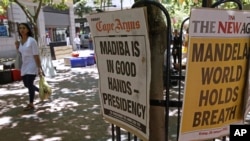This week South Africa's largest newspaper, the Sunday Times, revealed that two of its investigative reporters have been subject to harassment and intimidation, apparently by elements in the security forces. One of the reporters, Mzilikazi wa Afrika, was dragged from a car and threatened according to a Sunday Times deputy editor. Many journalists and others say there is a pattern of increasing hostility toward the media from the highest levels of government and the ruling African National Congress.
The Sunday Times says that investigative reporters Mzilikazi wa Afrika and Stephan Hofstatter have been subjected to telephone monitoring and personal surveillance since last year, but that this became blatant intimidation in December.
Deputy Editor Marvin Meintjies says this followed their reporting on questionable rental agreements for office space for police headquarters in Pretoria and also in KwaZulu/Natal.
"After we did our first expose of police lease deals, he ((Mzilikazi wa Afrika)) had an incident where people in police uniform, in a marked police vehicle pulled him over, dragged him out of his car, put a gun to his head and only fled when they realized he had a passenger in his car. In April this year, he had a similar incident; two cars attempted to force him off the road, and it became clear to us that there was a pattern of intimidation and threats to his security,” Meintjies said.
The public protector - a constitutionally mandated government watchdog - found the national police commissioner guilty of mishandling the office rental deal. She also criticized the public works minister for going ahead with the lease despite receiving legal advice to the contrary.
Surveillance confirmed
Meintjies says contacts in the security services have confirmed the surveillance and monitoring of the two reporters. He says this has made it difficult to know how to deal with it.
“So we had a conundrum, and our lawyers also were frankly stumped. Where do you turn if the arms of the state security services are actually implicated in wrongdoing, who do you turn to? And basically the suggestion from them, and our first thought as well, was that it has got to be a political intervention that that is the only way this is going to stop, hence the South African National Editors' Forum has sought a meeting with the minister,” Meintjies said.
Zuma hostility to press
Many journalists say that under the leadership of President Jacob Zuma, elements of both his administration and of the ruling African National Congress have become increasingly and openly hostile to the media.
Just before local government elections were held in May, Mr. Zuma and other ANC officials labelled the media as the only real opposition to the party.
Last year, the ANC announced plans to introduce a so-called Media Appeals Tribunal that overrides the current self-regulatory mechanisms in the media. The government also presented a new law to parliament that would tighten protection of government information.
The measure, known as the Protection of Information bill, would give sweeping powers to even low-level government officials to deny access to information. It would also impose severe penalties for whistle blowers and journalists.
It was recently withdrawn by the government for redrafting, however, following a sustained campaign by civil society organizations and appeals from respected South Africans such as Nobel Peace Laureate Desmond Tutu.
Media not without resources
Sunday Times editor, Meintjies and other observers say that, unlike during the apartheid era, today the media and South Africans are not without resources.
Anton Harber, professor of journalism and media studies at the University of the Witwatersrand, said the constitution protects freedom of speech and journalists.
“We have the protection of the courts and the constitution, and we certainly do and will use that, so it is not the way it was prior to our [1996] constitution, when really it was open season against the media. These are worrying developments, but what is clear now as opposed to the apartheid situation, is that such acts are clearly illegal and action can be taken to hopefully prevent them occurring again,” Harber said.
South Africans speak out strongly and are politically engaged with the issues affecting their daily lives. Harber says that this activism should be used to protect a free media in this country.
“I think what's become clear if you take these particular developments and the verbal attacks on the media in recent months, and the attempts to bring in legislation on the media, restricting media, then I think it has become absolutely clear that citizens and civil society need to be mobilized to be extremely vigilant about protecting press freedom and media freedom . I think it is clear there are at least some sectors within government who would like to see greater controls and restriction of the media and I think we are going to have to fight that off by mobilizing civil society,” Harber said.
Neither the police, nor the government, have commented on the reports of intimidation of the two Sunday Times reporters.




